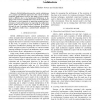Free Online Productivity Tools
i2Speak
i2Symbol
i2OCR
iTex2Img
iWeb2Print
iWeb2Shot
i2Type
iPdf2Split
iPdf2Merge
i2Bopomofo
i2Arabic
i2Style
i2Image
i2PDF
iLatex2Rtf
Sci2ools
116
click to vote
IROS
2009
IEEE
2009
IEEE
A learning approach to integration of layers of a hybrid control architecture
— Hybrid deliberative-reactive control architectures are a popular and effective approach to the control of robotic navigation applications. However, the design of said architectures is difficult, due to the fundamental differences in the design of the reactive and deliberative layers of the architecture. We propose a novel approach to improving system-level performance of said architectures, by improving the deliberative layer’s model of the reactive layer’s execution of its plans through the use of machine learning techniques. Quantitative and qualitative results from a physics-based simulator are presented.
Deliberative Layer | Deliberative Layer Model | Deliberative-reactive Control Architectures | IROS 2009 | Robotics |
Related Content
| Added | 24 May 2010 |
| Updated | 24 May 2010 |
| Type | Conference |
| Year | 2009 |
| Where | IROS |
| Authors | Matthew Powers, Tucker R. Balch |
Comments (0)

